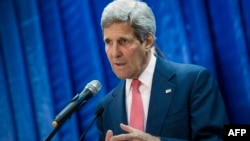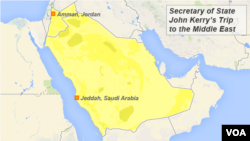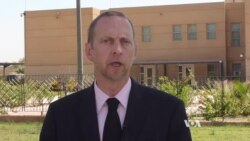U.S. Secretary of State John Kerry says a new, more inclusive government in Iraq means it is "full speed ahead" for an international coalition to fight Islamic State militants who control territory along Iraq's border with Syria. Kerry spent the day in Baghdad meeting with Iraq's new leaders.
Kerry said overcoming deep divisions in Iraqi society and passing political power peacefully amidst the "barbarity" of attacks from Islamic State militants is a great accomplishment for Iraq's new leaders. But their real work is just beginning.
"Establishing a government does not mean a lot if it is not able to govern effectively or does not govern inclusively," said Kerry.
After meeting with Iraq's new president, prime minister, and foreign minister, Kerry said they share a commitment to resolve long-standing grievances over budgeting, federalism, oil policy and the inclusivity of security forces, differences he says were largely put-off by outgoing prime minister Nouri al-Maliki.
Al-Maliki's marginalizing Iraq's Sunni minority played a part in the rise of Islamic State militants, who are also known as ISIL. So there was no building a coalition against them as long as he stayed in power.
"As President Obama has made clear from the beginning, a new and inclusive Iraqi government has to be the engine of our global strategy against ISIL," said Kerry. "And now that the Iraqi parliament has approved a new Cabinet with new leaders and representation from all Iraqi communities, it is full speed ahead."
Kerry made the comments after meeting earlier with Prime Minister Haider al-Abadi at the start of a weeklong trip to the Middle East to rally countries to an international alliance for battling the Islamic State militant group.
Coalition building
He said he was on a mission “to assemble the broadest possible coalition for this fight.”
Kerry said some in that coalition will help train, arm and equip Iraqi forces. Others will contribute humanitarian relief or help cut off militant funding or block the flow of foreign fighters.
Kerry said his visit to Iraq wasn't just to build the coalition or to talk with Iraq's new leaders about how to move forward, but also to show Iraq that the United States will stand by them.
“We all have an interest in supporting the new government of Iraq at this particular critical junction,” he said. “The coalition that is at the heart of our global strategy I assure you will continue to grow and deepen in the days ahead.
Earlier, Kerry told al-Abadi he was “encouraged” by the premier's plans for the “reconstituting” of the military and “your commitment to broad reforms that are necessary in Iraq to bring every segment of Iraqi society to the table.”
Kerry also said he was "very encouraged" in meeting with Iraq's new leaders.
"I have never seen the unanimity without complaint about the sense of direction, about the commitment of inclusion" during my many meetings here, Kerry said.
Kerry said he was optimistic that the new Iraqi government could unite the country. Al-Abadi's predecessor, Nouri al-Maliki, was blamed for marginalizing Iraq's Sunni minority and helping give rise to extremists.
Al-Abadi faces multiple crises from the need to pull Sunni Muslims back from armed revolt to persuading minority Kurds not to break away and convincing al-Abadi's own majority Shi'ites he can protect them from Sunni hardliners.
On Wednesday, al-Abadi called for the international community to help Iraq fight the Islamic State extremists, urging all nations “to act immediately to stop the spread of this cancer”
“Of course our role is to defend our country, but the international community is responsible for protecting Iraq and protecting Iraqis and the whole region,” al-Abadi said at the close of his meeting with Kerry.
However, cleric Moqtada al-Sadr, head of a powerful Shi'ite movement in Iraq, said on Wednesday that Iraq should not cooperate with “occupiers.”
“We wish for Iraq to cooperate with the neighboring countries and its allies, but not with the occupiers,” said Sadr, whose opinions hold sway over tens of thousands of militants.
His comments highlight the difficulties that al-Abadi faces in his attempts to unify a country that rival militias are threatening to tear apart.
Also, the new prime minister's cabinet is still without ministers for defense and interior. But the senior State Department official said al-Abadi was "extremely close" to getting consensus on those posts and he thought it a "wise move" to have delayed them.
Hours after Kerry began his visit to Baghdad, Iraqi officials said at least two car bombs exploded in an eastern part of the capital, killing at least 12 people and wounding dozens more in the country's latest instance of unrest.
Meetings ahead
Kerry said nearly every nation has a role in wiping out the Islamic State group. Roles will include taking up arms, sending humanitarian aid to Islamic State's victims, working to cut off funds to the group, preventing the flow of foreign fighters and counteracting propaganda.
Those efforts will likely be the focus of Kerry's talks later Wednesday when Kerry is to meet with Jordan's King Abdullah.
The U.S.'s top diplomat will then travel on Thursday to Saudi Arabia for talks that will include Egypt, Turkey, Jordan and the six-country Gulf Cooperation Council (GCC), which comprises Saudi Arabia, Bahrain, the United Arab Emirates, Kuwait, Oman and Qatar.
Saudi Arabia is unnerved by the rapid advance of Islamic State fighters and fears the group could radicalize some of its own citizens and lead to attacks on the U.S.-allied government.
Obama wants Gulf Arab states to crack down on the flow of money and foreign fighters to Islamic State, consider military action and support to Sunni Muslim moderates in Iraq and Syria, possibly through direct funds.
In Jordan, Kerry is expected to receive requests for extra military aid, including helicopters and border security equipment, along with part of the $500 million the Obama administration has proposed to accelerate training of moderate Syrian rebels, a Jordanian official told Reuters.
Jordan is considered a top choice to host the training of the rebels due to its close security relationship with Washington, proximity to neighboring Syria and pool of more than 600,000 Syrian refugees.
Jordan, however, fears retaliation from Syria if its territory is used for overt training.
Some materials for this report came from Reuters and AFP.















